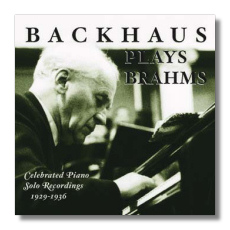
The Internet's Premier Classical Music Source
Related Links
- Brahms Reviews
- Latest Reviews
- More Reviews
-
By Composer
-
Collections
DVD & Blu-ray
Books
Concert Reviews
Articles/Interviews
Software
Audio
Search Amazon
Recommended Links
Site News
 CD Review
CD Review
Johannes Brahms

Celebrated Piano Solo Recordings 1929-1936
- Scherzo, Op. 4
- Variations on a Theme by Paganini, Op. 35
- Waltzes, Op. 39
- Rhapsodies, Op. 79
- Hungarian Dances #6 and 7
- Variations on an Original Theme, Op. 21 #1
- Extensive excerpts from Opp 10, 76, 116, 117, 118, and 119
Wilhelm Backhaus, piano
Music & Arts CD-1132(2) AAD monaural 2CDs: 58:13, 71:46
Brahms was an important composer for the Leipzig-born Wilhelm Backhaus. These recordings were made in his 30s and 40s – still a young man by pianistic standards! Three decades later he continued to carry the torch, bringing the experience of a lifetime to this repertoire, yet it his earlier Brahms records that are the most characteristic of his work – and, I would venture to say, most Brahmsian. (The young Backhaus actually heard Brahms conduct his two piano concertos in Leipzig; Eugen d'Albert was the soloist.)
This is a useful collection of Backhaus's "celebrated piano solo recordings" made for the HMV label between 1929 and 1936. They've been on CD before, but in conjunction with Backhaus's early recordings of the two piano concerti, and the new transfers by Maggi Payne and Graham Newton obscure none of the pianist's nuances of tone and expression.
At this stage in his career, Backhaus's Brahms was bluff and masculine – rather Walt Whitman-like, yet also quite youthful. Later, he would soften the outlines and take a more Romantic viewpoint, but here, he has little time for daydreaming and for poetry per se. His head is in charge, and sometimes even his amazingly agile fingers and powerful wrists can't keep up with it. (The traces of age-related decay one hears in his 1967 recording of the Second Piano Concerto, for example, just don't enter into the equation here.) He could sustain long, singing legato lines without becoming dependent on the pedal. Backhaus is for listeners who want their Brahms to be tough without crossing over into violence. His playing is old-fashioned, which is all the more reason it should be preserved on issues such as this one. Bryce Morrison's booklet note is well written and equitable. Recording dates and master information have been included. The two discs fit neatly in a standard sized jewel box.
Copyright © 2004, Raymond Tuttle


















